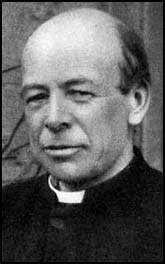
Credit: Wikipedia
If life is just a game that we play, then death is one of the greatest game-changers there is. Like all the great milestones in life, from getting married to having children, death is a change that is facilitated through exchanging one lifestyle for another. It’s a give and take that leaves us with something new after we let go of a dear part of our past. But Henry Scott-Holland’s “Death is Nothing at All” challenges this notion by voicing all of the thoughts and feelings that won’t change after a death has occurred.
Like all the great milestones in life, from getting married to having children, death is a change that is facilitated through exchanging one lifestyle for another.
As a Canon (or priest) at St. Paul’s Cathedral, Scott-Holland has imbued this work with glimpses of heaven and the afterlife as a form of comfort for keeping the deceased closer to the hearts of the living. As he writes, “I have only slipped away into the next room/I am I and you are you/Whatever we were to each other/That we are still” (2-5), he diminishes the space between someone who has died and those that are mourning. However close you are to a beloved person, they are still a separate entity from you. And death doesn’t change that. Love remains after death, although it can change and warp in different ways as it waxes and wanes throughout the years. But even in death, our loved ones remain close by “in the next room” as they find a new place in the afterlife or perhaps another state of non-being.

Credit: Wikipedia
The poem continues with, “Let my name be ever the household word that it always was/Let it be spoken without effort” (13-14), which openly speaks to many of our wishes to be remembered but not mourned. As life is speckled with thoughts of laughter, jokes, smiles and joy, so too are these thoughts littered throughout the poem. These are the good times that make up family and friendships. This is what brings us close to those we can no longer be with in life, although they are not lost to us in our thoughts.
As life is speckled with thoughts of laughter, jokes, smiles and joy, so too are these thoughts littered throughout the poem.
This brings us to the question: “Why should I be out of mind/Because I am out of sight?” (19-20), which highlights a fear that is seen in many as they worry about losing the memory of someone that they cherished. But if love was real, then it will always stay with you and change your own way of living. Although the opportunity to make new memories with someone who has passed is gone, you can still make a new life and build separate memories based on what you learned from them in the past.
Related SevenPonds Articles:

 “Death is Nothing at All” by Canon Henry Scott-Holland
“Death is Nothing at All” by Canon Henry Scott-Holland


 Our Monthly Tip: Make an “In Case of Death” File to Ease Loved One’s Grief
Our Monthly Tip: Make an “In Case of Death” File to Ease Loved One’s Grief
 Passing of Beloved Comedian Births a New Comedy Festival
Passing of Beloved Comedian Births a New Comedy Festival















